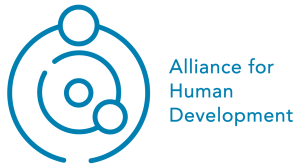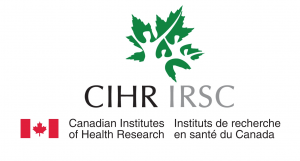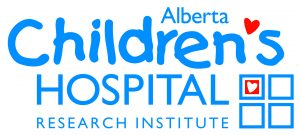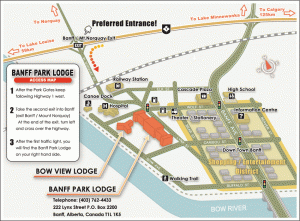2018 Meeting of the Canadian DOHaD Society
February 14, 2018
Banff Park Lodge in Banff, Alberta
The 2018 Scientific Meeting of the Canadian DOHaD Society will be held February 14, 2018 at the Banff Park Lodge in Banff, AB.
The program will include Keynote addresses by Tessa Roseboom (Principal Investigator, the Dutch famine birth cohort; University of Amsterdam) and Pathik Wadhwa (Director, University of California Irvine Development, Health and Disease Research Program).
The day will also feature talks by trainees, a “DOHaD translational research” panel discussion, updates from the CIHR DOHaD Funded Teams, and a poster session in conjunction with the Canadian National Perinatal Research Meeting, February 14-17, 2018 (www.cnprm.org).
DOHaD Canada is holding its meeting in conjunction with the Canadian National Perinatal Research Meeting (CNPRM). Please note that CNPRM and DOHaD Canada meetings have separate registration and accommodation. To register for CNPRM and arrange accommodation for the CNPRM meeting, please go to the CNPRM meeting site.

Accommodation:
Banff Park Lodge
222 Lynx St,
Banff, Alberta T1L 1K5
Phone: (403) 762-4433
You can now reserve your guest room online.
Click here for Group Guest Room Bookings
The Group ID is 28777 and the Password is 37039210
If you wish to extend your stay on either side of the workshop, you will need to call the hotel directly.
Please remember for those who are planning to attend both DOHaD Canada and CNPRM that the accommodations are at different locations and it is very important that you book your DOHaD Canada accommodation for February 13th at the Banff Park Lodge (BPL).
Despite the need to move to a new accommodation after DOHaD Canada, it will save you money and ensure the DOHaD Canada meeting runs to budget.
Please note that we will arrange the transportation of you and your luggage from BPL to the Banff Centre, if needed. There will be a sign-up sheet at the registration desk in the morning of the meeting, February 14th.
Keynote Speakers:
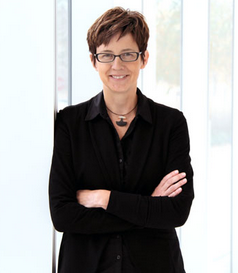 Department of Anthropology, University of Toronto.
Department of Anthropology, University of Toronto.
Dr. Tracey Galloway is a community health scholar whose research addresses the health priorities of circumpolar Indigenous people. Her research program involves reduction of the impact of chronic disease through applied health policy research to reduce health inequities and promote health system improvement. Current CIHR-funded projects include evaluation of the impact of food subsidy programs on food security, understanding the impact of competitive health program funding models on Yukon First Nations, and qualitative assessment of Inuit people’s journeys through cancer diagnosis and treatment.
Her research examines patterns of child growth and nutrition, prevalence of overweight and obesity, and incidence and prevalence of chronic diseases such as diabetes, hypertension, cardiovascular disease, chronic lung disease and cancer in Indigenous populations. Dr. Galloway’s methodological work addresses the use of international reference standards for growth and obesity assessment in Indigenous populations. Dr. Galloway has a proven track record of respectful engagement and successful collaboration with northern communities and organizations. Through research and advocacy, Dr. Galloway maintains close working relationships with health experts and policy-makers in Canada’s Indigenous regions.
Title: A framework for intervention research that shifts trajectories of health for Indigenous people
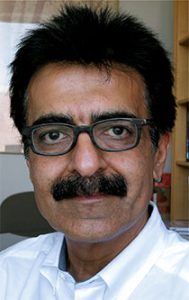
Pathik D. Wadhwa, M.D., Ph.D Director, University of California Irvine Development, Health and Disease Research Program. Pathik D. Wadhwa is a Professor of Psychiatry & Human Behavior, Obstetrics & Gynecology, Pediatrics, and Epidemiology at the University of California, Irvine, School of Medicine, and the founding director of the UC Irvine Development, Health and Disease Research Program. Dr. Wadhwa received his medical degree from the University of Poona, India, in 1985, and his doctorate in social ecology (behavioral medicine concentration) from the University of California, Irvine, in 1993. His research examines the interface between biological, social and behavioral processes in human pregnancy, with an emphasis on outcomes related to fetal development, birth, and subsequent newborn, infant and child development and health. In particular, this work focuses on the interplay between maternal-placental-fetal neuroendocrine, immune, metabolic and genetic/epigenetic processes as putative mechanisms that mediate the effects of the maternal environment (and particularly prenatal stress and stress-related processes) on early human development. Dr. Wadhwa has published over 100 peer-reviewed scientific papers and lectured extensively at scientific meetings and universities across North America, Europe and Australia. His program has been continuously supported by several research grants from the U.S. National Institutes of Health and other agencies. Dr. Wadhwa is the recipient of several national honors and awards, including recognition for his early- and mid-career contributions from the Academy of Behavioral Medicine, the Perinatal Research Society, the National Institutes of Health, and the World Health Organization.
Title: Intergenerational transmission during gestation of the effects of maternal childhood trauma exposure
| Maria B. Ospina, MSc, PhD Assistant Professor Departments of Obstetrics & Gynecology and Medicine Faculty of Medicine & Dentistry School of Public Health University of Alberta Tel: (780) 735-8732; F: (780) 735-4981 E-mail: mospina@ualberta.ca |
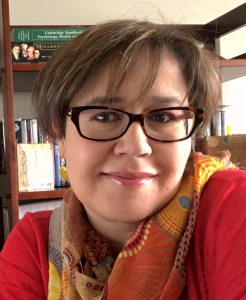 |
| Dr. Ospina is a clinical epidemiologist and Assistant Professor in the Departments of Obstetrics and Gynecology, and Medicine at the Faculty of Medicine & Dentistry of the University of Alberta. She also holds an adjunct appointment with the University of Alberta School of Public Health. Dr. Ospina’s program of research is focused in the application of knowledge-to-action approaches in which epidemiological and knowledge synthesis methods inform how maternal, prenatal care, and social influences in the first 1,000 days of life shape the trajectories of future health. The main directions of Dr. Ospina’s program of research are: 1) Integrating a life-course approach to understand gestational and perinatal precursors of chronic diseases, 2) Identifying pathways of inequalities in Indigenous maternal and perinatal health and how to mitigate potential inequality gaps, and 3) Applying knowledge synthesis methods to maternal and perinatal research evidence. She is currently studying the trajectories of respiratory morbidity and health services utilization in the first 5 years of life among neonates experiencing adverse birth outcomes. Dr. Ospina co-leads a Maternal and Perinatal Métis Health Research Initiative in collaboration with the Métis Nation of Alberta to evaluate the mediating role of social determinants on maternal and perinatal health and services use outcomes among Métis in Alberta. Dr. Ospina’s research is funded by the generous support of the Lois Hole Hospital for Women through the Women and Children’s Health Research Institute, and grants from the Lung Association, and the Health Outcomes Improvement Fund. | |
| Gerry Giesbrecht PhD, R.Psych Assistant Professor Departments of Paediatrics and Community Health Sciences University of Calgary Tel: (403) 441-8469 E-mail:ggiesbre@ucalgary.ca |
 |
|
Dr. Giesbrecht is a registered Clinical Psychologist in the province of Alberta and Assistant Professor in the Departments of Paediatrics and Community Health Sciences at the University of Calgary. Dr. Giesbrecht’s research program focuses on the psychobiology of stress, and especially on the effects of stress during pregnancy on child development. He is currently studying the effects of risk and resilience factors, such as prenatal nutrition, postnatal caregiving, and temperament on children’s neurodevelopmental outcomes. His research is funded by the Canadian Institutes of Health Research, the Social Sciences and Humanities Research Council, the SickKids Foundation. He is the lead investigator of the Fetal Programming study, a cohort of 294 women who have been followed since early pregnancy and with whom he conducted intensive assessment of stress physiology. He is a co-investigator of the Alberta Pregnancy Outcomes and Nutrition (APrON) study, a longitudinal cohort of 2200 women and children that focusses on the effects of prenatal nutrition on maternal mental health and child neurodevelopment. The overall objectives of his research program are: to identify the mechanisms by which in utero exposure to maternal stress becomes biologically embedded in children’s development, to identify risk and resilience factors that modify the effects of early life stress exposure on children’s development, and to develop effective intervention and prevention strategies to prevent or reduce the effects of early life stress exposure on children’s development. |
|
Organizers committee–Trainees:
Dr. Laura Reyes-Martinez (University of Alberta)
Dr. Luseadra McKerracher (McMaster University)
Ms. Stephana Cherak (University of Calgary).
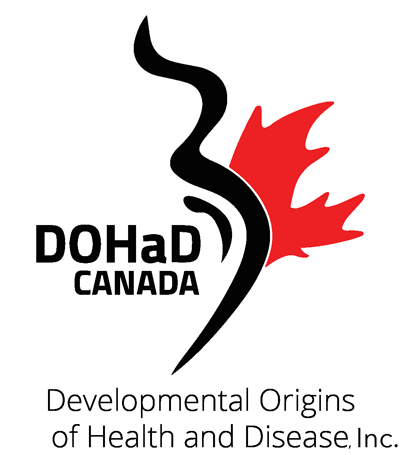

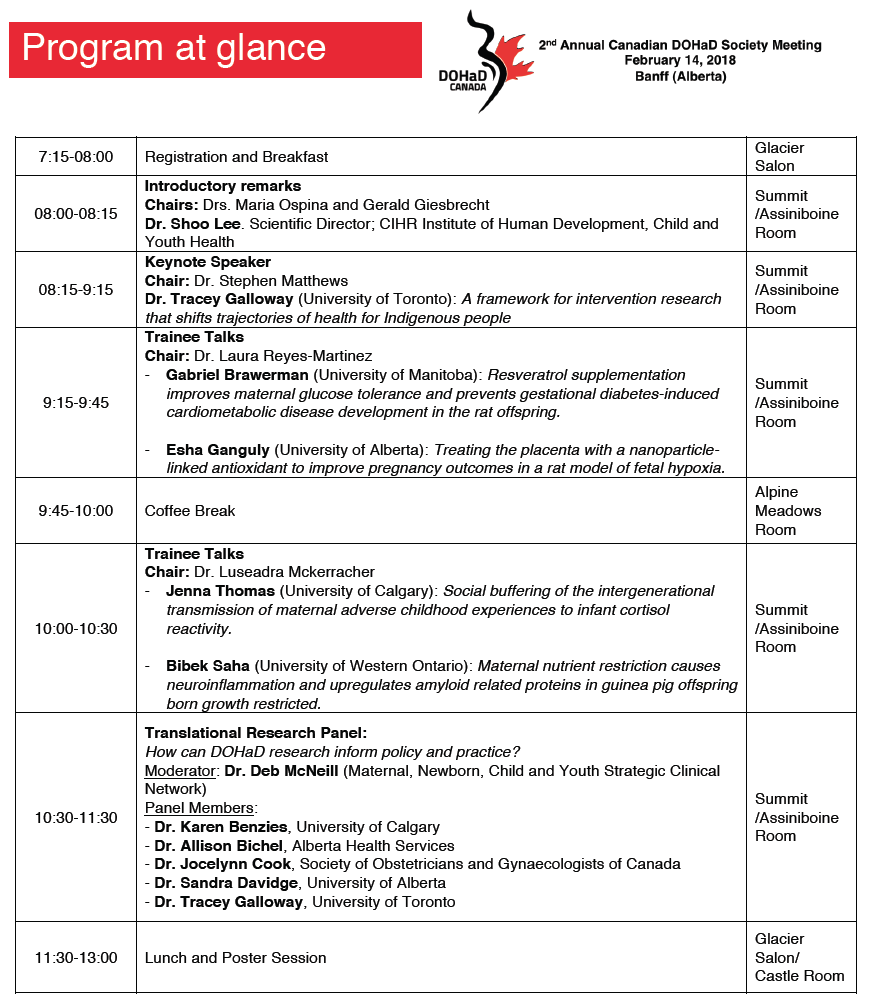
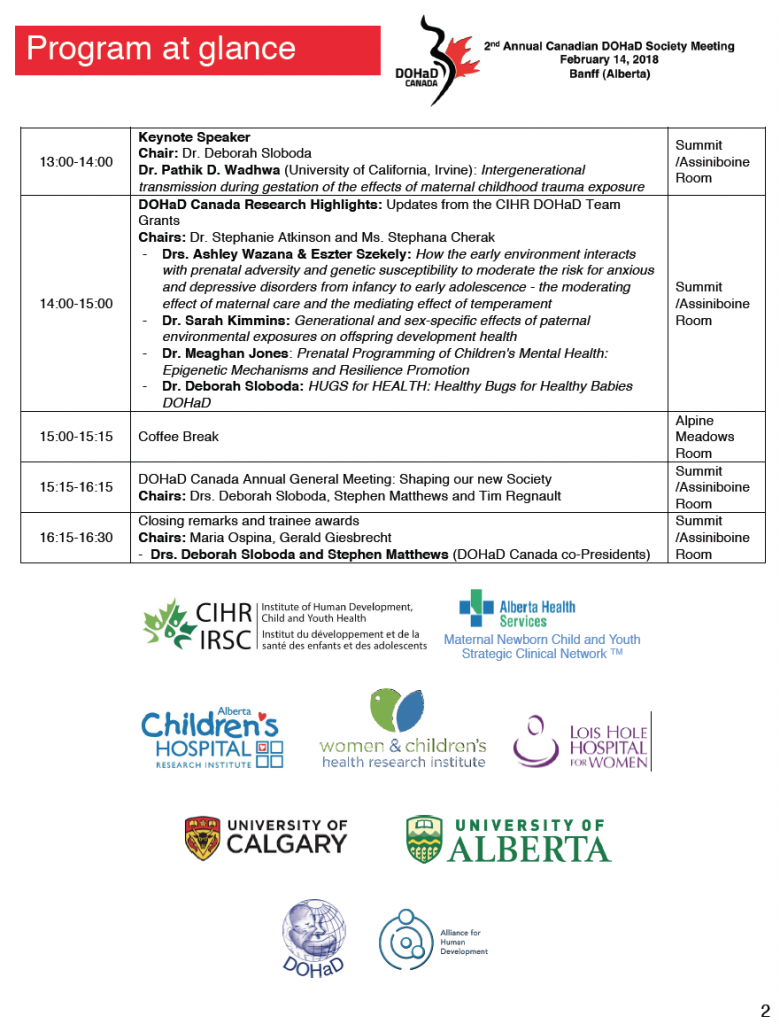
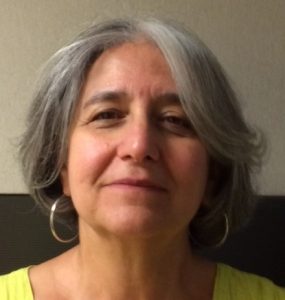 Dr. Deb McNeill is the Scientific Director for the Maternal Newborn Child and Youth Strategic Clinical Network in Alberta Health Services. She is also an Adjunct Associate Professor in the Faculty of Nursing and the Department of Community Health Sciences, Cumming School of Medicine at the University of Calgary. Deb received a BSc in Nursing from the State University of New York at Buffalo and an MN with specialization in neonatal care followed by a PhD with specialization in epidemiology, both from the University of Calgary. Deb has a 25 year clinical background in Neonatal Intensive Care and has held research positions in maternal child health and population public health for the past 16 years. Deb’s has a broad research focus that currently includes perinatal depression and anxiety, measuring health inequities, childhood immunization, and group pre and postnatal care. She has expertise in a variety of research approaches including epidemiologic and qualitative research methods as well as synthesis and systematic evidence reviews. From 2009 to 2017 Deb led a team of Scientists and Research Associates who used integrated knowledge translation approaches to generate and translate scientific evidence to support decision making in Population Public and Indigenous Health.
Dr. Deb McNeill is the Scientific Director for the Maternal Newborn Child and Youth Strategic Clinical Network in Alberta Health Services. She is also an Adjunct Associate Professor in the Faculty of Nursing and the Department of Community Health Sciences, Cumming School of Medicine at the University of Calgary. Deb received a BSc in Nursing from the State University of New York at Buffalo and an MN with specialization in neonatal care followed by a PhD with specialization in epidemiology, both from the University of Calgary. Deb has a 25 year clinical background in Neonatal Intensive Care and has held research positions in maternal child health and population public health for the past 16 years. Deb’s has a broad research focus that currently includes perinatal depression and anxiety, measuring health inequities, childhood immunization, and group pre and postnatal care. She has expertise in a variety of research approaches including epidemiologic and qualitative research methods as well as synthesis and systematic evidence reviews. From 2009 to 2017 Deb led a team of Scientists and Research Associates who used integrated knowledge translation approaches to generate and translate scientific evidence to support decision making in Population Public and Indigenous Health. Allison Bichel, MPH, MBA, PhD, Senior Provincial Director, Alberta Health Services, has a 25 year career as a social innovator in business and healthcare. She thrives on engaging people to understanding complexity and affect change. She’s worked in the private sector on new product and business development, established a vibrant independent consulting practice, and led numerous initiatives to innovate in strategy, policy, process, and technology. Allison’s latest adventures are with Alberta’s Maternal Child Newborn and Youth, and Addiction and Mental Health Strategic Clinical Networks. Allison has a PhD in Human and Organizational Systems. She also has three Masters Degrees in Public Health, Business, and Human Development, and an undergraduate degree in Nursing.
Allison Bichel, MPH, MBA, PhD, Senior Provincial Director, Alberta Health Services, has a 25 year career as a social innovator in business and healthcare. She thrives on engaging people to understanding complexity and affect change. She’s worked in the private sector on new product and business development, established a vibrant independent consulting practice, and led numerous initiatives to innovate in strategy, policy, process, and technology. Allison’s latest adventures are with Alberta’s Maternal Child Newborn and Youth, and Addiction and Mental Health Strategic Clinical Networks. Allison has a PhD in Human and Organizational Systems. She also has three Masters Degrees in Public Health, Business, and Human Development, and an undergraduate degree in Nursing. Dr. Karen Benzies, BScN, MN, PhD; RN is a Professor and Associate Dean (Research) with the Faculty of Nursing. She holds Adjunct Appointments with the Departments of Paediatrics and Community Health Sciences, Cumming School of Medicine. She received a PhD from the University of Alberta and completed post-doctoral fellowships at Stockholm University and the University of Ottawa. She leads a program of research in early life environment and child development. Dr. Benzies has published over 80 articles in peer-reviewed journals, 40 technical reports, and 3 book chapters. She has given more than 100 media interviews, and over 200 presentations to community groups, professional organizations, and at conferences. In addition to awards for her research and teaching, in 2016, Dr. Benzies received the Canadian Association of Perinatal and Women’s Health Nurses, Excellence in Leadership Award. Her greatest honor was the Westbury Legacy Award from the Alberta Centre for Child, Family and Community Research to recognize her mentorship of graduate students and community partners working in child, family and community research. Dr. Benzies most satisfying accomplishments come from creating linkages among researchers, clinicians, and policy makers to improve the health and well-being of young children and their families.
Dr. Karen Benzies, BScN, MN, PhD; RN is a Professor and Associate Dean (Research) with the Faculty of Nursing. She holds Adjunct Appointments with the Departments of Paediatrics and Community Health Sciences, Cumming School of Medicine. She received a PhD from the University of Alberta and completed post-doctoral fellowships at Stockholm University and the University of Ottawa. She leads a program of research in early life environment and child development. Dr. Benzies has published over 80 articles in peer-reviewed journals, 40 technical reports, and 3 book chapters. She has given more than 100 media interviews, and over 200 presentations to community groups, professional organizations, and at conferences. In addition to awards for her research and teaching, in 2016, Dr. Benzies received the Canadian Association of Perinatal and Women’s Health Nurses, Excellence in Leadership Award. Her greatest honor was the Westbury Legacy Award from the Alberta Centre for Child, Family and Community Research to recognize her mentorship of graduate students and community partners working in child, family and community research. Dr. Benzies most satisfying accomplishments come from creating linkages among researchers, clinicians, and policy makers to improve the health and well-being of young children and their families. Dr. Jocelynn Cook graduated with a PhD in Reproductive Physiology from the Medical University of South Carolina in 1997 and spent 10 years in an academic setting as graduate student, a post-doctoral fellow and an Assistant Professor. Wanting to expand her skillset beyond the basic science laboratory, she embarked on a Masters of Business Administration, and graduated from the University of Saskatchewan with an MBA, specializing in Economics and Health Policy. Her professional career has focused on issues related to maternal-fetal medicine; specifically, substance abuse during pregnancy, preterm birth, Fetal Alcohol Spectrum Disorder (FASD) and Assisted Human Reproduction. She has gained expertise in clinical research and issues related to clinical practice for pregnant women and their children and program evaluation, as well as experience with population and epidemiology research. Early on in her career, she became involved with Aboriginal Health research, especially as it related to the social determinants of health. This broadened her research perspective and she gained expertise related to suicide prevention, mental health and addictions, child development, communicable diseases, chronic diseases, health surveillance and National and International trends in morbidity and mortality. Dr. Cook joined the Society of Obstetricians and Gynaecologists of Canada as its first Scientific Director in 2014 and oversees all work related to Continuing Medical Education, Clinical Practice Guidelines, Research, Accreditation, Global Health and Indigenous Health. Dr. Cook is an Adjunct Professor to the department of Obstetrics and Gynecology at the University of Ottawa, appointed in 2002. Dr. Cook’s specific research interests include screening for alcohol use during pregnancy, collecting diagnostic data, health professional education and training, and polysubstance use.
Dr. Jocelynn Cook graduated with a PhD in Reproductive Physiology from the Medical University of South Carolina in 1997 and spent 10 years in an academic setting as graduate student, a post-doctoral fellow and an Assistant Professor. Wanting to expand her skillset beyond the basic science laboratory, she embarked on a Masters of Business Administration, and graduated from the University of Saskatchewan with an MBA, specializing in Economics and Health Policy. Her professional career has focused on issues related to maternal-fetal medicine; specifically, substance abuse during pregnancy, preterm birth, Fetal Alcohol Spectrum Disorder (FASD) and Assisted Human Reproduction. She has gained expertise in clinical research and issues related to clinical practice for pregnant women and their children and program evaluation, as well as experience with population and epidemiology research. Early on in her career, she became involved with Aboriginal Health research, especially as it related to the social determinants of health. This broadened her research perspective and she gained expertise related to suicide prevention, mental health and addictions, child development, communicable diseases, chronic diseases, health surveillance and National and International trends in morbidity and mortality. Dr. Cook joined the Society of Obstetricians and Gynaecologists of Canada as its first Scientific Director in 2014 and oversees all work related to Continuing Medical Education, Clinical Practice Guidelines, Research, Accreditation, Global Health and Indigenous Health. Dr. Cook is an Adjunct Professor to the department of Obstetrics and Gynecology at the University of Ottawa, appointed in 2002. Dr. Cook’s specific research interests include screening for alcohol use during pregnancy, collecting diagnostic data, health professional education and training, and polysubstance use. Dr. Sandra Davidge is the Executive Director of the Women and Children’s Health Research Institute and Professor in the Departments of Obstetrics & Gynecology and Physiology at the University of Alberta. She also holds the Tier 1 Canada Research Chair in Maternal and Perinatal Cardiovascular Health. She a Fellow in the Canadian Academy of Health Sciences and is President (2017/2018) for the international Society for Reproductive Investigation. She serves on many national and international grant panels and is on the editorial board for the American Journal of Physiology. Dr. Davidge is a founding Council Member for Canadian Developmental Origins of Health and Disease (DOHaD) Society, Advisory Board Member for the Preeclampsia Foundation of Canada and Board Director for PolicyWise for Children and Families and the Maternal, Infant, Children, Youth Research Network (MICYRN). Dr. Davidge’s research program with her graduate students, postdoctoral fellows, research associate and technicians encompasses studying cardiovascular function as it relates to 1) complications in pregnancy (preeclampsia and maternal aging) and 2) developmental origins of adult cardiovascular diseases. Both preeclampsia and aging are associated with vascular endothelial dysfunction and oxidative stress; hence her research program focuses on common vasoactive mediators altered by pro-oxidants in these conditions that are unique to women and their pregnancy outcomes. Moreover, Dr. Davidge’s laboratory combines their expertise in pregnancy research and aging to understand long-term consequences of an adverse pregnancy on cardiovascular health of the offspring as they age. Ultimately, their goal is to create and provide the knowledge necessary to develop preventative /therapeutic strategies for cardiovascular complications, particularly as it relates to maternal and perinatal health. Dr. Davidge has published over 200 original peer-reviewed manuscripts and 25 review articles in these areas and is currently funded by multiple operating grants from the Canadian Institutes for Health Research.
Dr. Sandra Davidge is the Executive Director of the Women and Children’s Health Research Institute and Professor in the Departments of Obstetrics & Gynecology and Physiology at the University of Alberta. She also holds the Tier 1 Canada Research Chair in Maternal and Perinatal Cardiovascular Health. She a Fellow in the Canadian Academy of Health Sciences and is President (2017/2018) for the international Society for Reproductive Investigation. She serves on many national and international grant panels and is on the editorial board for the American Journal of Physiology. Dr. Davidge is a founding Council Member for Canadian Developmental Origins of Health and Disease (DOHaD) Society, Advisory Board Member for the Preeclampsia Foundation of Canada and Board Director for PolicyWise for Children and Families and the Maternal, Infant, Children, Youth Research Network (MICYRN). Dr. Davidge’s research program with her graduate students, postdoctoral fellows, research associate and technicians encompasses studying cardiovascular function as it relates to 1) complications in pregnancy (preeclampsia and maternal aging) and 2) developmental origins of adult cardiovascular diseases. Both preeclampsia and aging are associated with vascular endothelial dysfunction and oxidative stress; hence her research program focuses on common vasoactive mediators altered by pro-oxidants in these conditions that are unique to women and their pregnancy outcomes. Moreover, Dr. Davidge’s laboratory combines their expertise in pregnancy research and aging to understand long-term consequences of an adverse pregnancy on cardiovascular health of the offspring as they age. Ultimately, their goal is to create and provide the knowledge necessary to develop preventative /therapeutic strategies for cardiovascular complications, particularly as it relates to maternal and perinatal health. Dr. Davidge has published over 200 original peer-reviewed manuscripts and 25 review articles in these areas and is currently funded by multiple operating grants from the Canadian Institutes for Health Research.